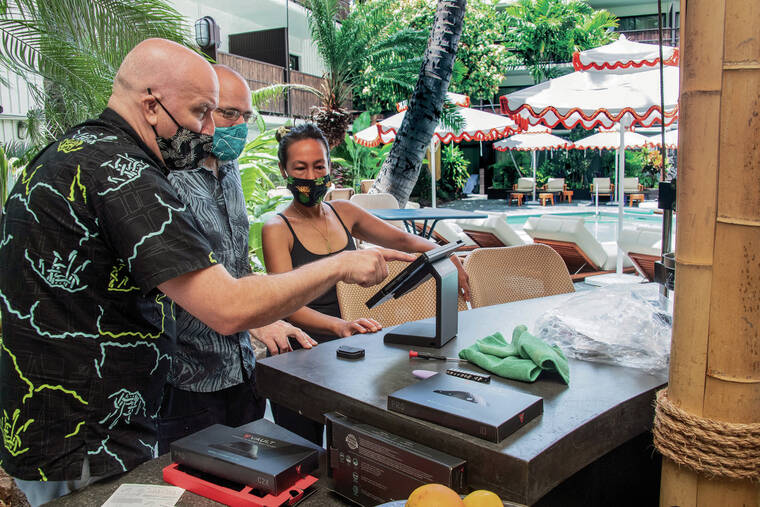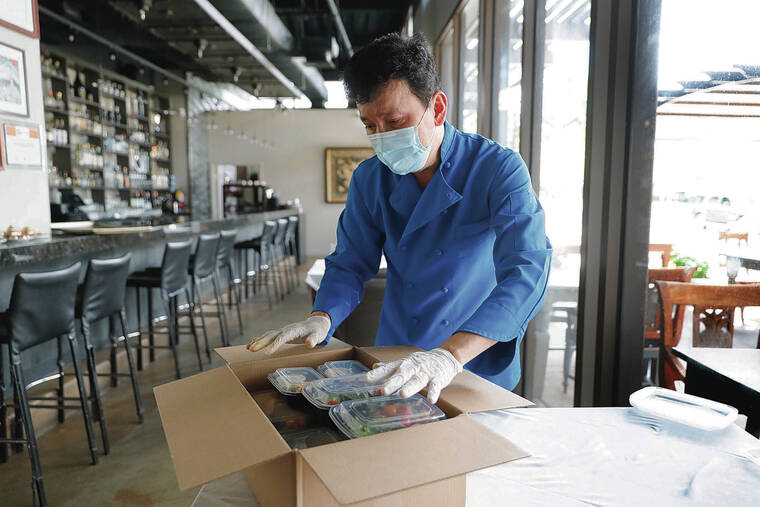Oahu restaurant owners brace for COVID-19 vaccine requirement

CRAIG T. KOJIMA / CKOJIMA@STARADVERTISER.COM
Chuck Bussler, left, and Robynne Maii, right, recently opened Heyday restaurant at the White Sands Hotel in Waikiki. Bussler, Dave Power, and Maii worked Friday at the restaurant’s bar.

JAMM AQUINO / 2020
Chai Chaowasaree opened Kalo Hawaiian Food by Chai in Waikiki three months ago and was enjoying his best year ever but is now receiving cancellations. Adapting to pandemic restrictions, Chaowasaree created Wikiwiki dinner boxes last year at his Chef Chai at Pacifica Honolulu restaurant.


Among all of the economic concerns confronting the islands, Oahu restaurants face extra uncertainty over how their employees will react when they are required to get at least one COVID-19 Opens in a new tab vaccination or provide weekly proof of negative tests starting Monday.
An informal survey of 120 restaurants conducted by the Hawaii Restaurant Association in response to the impending Safe Access O‘ahu program found that 60% of restaurant owners believe they will lose 25% of their employees, who would rather quit than follow the vaccination and testing rules, which are scheduled to be in effect for 60 days.
Restaurant employees who quit their jobs would not be eligible for unemployment benefits, said Greg Maples, chairman of the 900-member Hawaii Restaurant Association.
“A lot of the employees that work at restaurants don’t necessarily have access to the right information,” Maples said. “A lot of it comes from social media and from friends. But if you quit for the reason that your employer has mandated a vaccination, you cannot collect unemployment.”
The projected loss of employees tracks with what Lindsey Dymond, owner of Oahu’s four Kalapawai Market and Cafes, is hearing from about 50 of his unvaccinated employees. The vaccine holdouts are typically younger and remain defiant even after the Centers for Disease Control and Prevention gave full approval on Aug. 23 to Pfizer-BioNTech’s vaccine for people age 16 and older.
The lack of full approval has often been cited as the main reason people refused to get vaccinated.
Don't miss out on what's happening!
Stay in touch with breaking news, as it happens, conveniently in your email inbox. It's FREE!
Now Dymond’s vaccine holdouts, who represent about 40% of his 120-employee workforce, cite other reasons. “The common ones are, ‘You can’t tell me what to do and you can’t make me do it,’” he said.
But there’s also “pretty much every reason under the sun,” including unfounded fears the COVID-19 vaccine contains stem cells from aborted fetuses and microchips to track vaccine recipients, he said.
“I say, ‘What do you think your cell phone is doing?’”
Dymond said he and his leadership team now have to write a manual about how the business is dealing with COVID-19 for the state Health Department and Honolulu Liquor Commission.
At the same time, he is preparing contingency plans to stay in business if employees quit en masse, including the possibility of shuttering dine-in service and converting to takeout and delivery only.
Dymond believes restaurant employees who refuse to get vaccinated won’t tolerate undergoing weekly testing on their own time.
“On Sept. 11 and Sept. 12 those lines at testing centers are going to be miles long,” he said. “It’s going to take all day to take that test every week.”
So this week Dymond will have to make work schedules without knowing for certain how many employees will refuse to comply with the Safe Access O‘ahu mandates.
COVID-free proof
The program covers both workers and patrons, requiring proof of vaccination or a negative COVID-19 test within the previous 48 hours to enter restaurants, bars, indoor gym facilities, entertainment and recreational settings. It does not apply to restaurant customers who spend less than 15 minutes picking up takeout orders.
The projected loss of restaurant employees adds to even more economic uncertainty for the industry.
Gov. David Ige made national headlines Aug. 23 by asking visitors to stay away from the islands at least through the end of October and for residents to limit travel to essential business purposes only.
Even before Ige’s announcement, COVID-19 case counts continued to soar and the Hawaii economy already was slowing faster than usual as visitor travel softened before Labor Day and the end of summer, which typically represents the start of Hawaii’s slower “shoulder season.”
‘Really tough time’
Restaurants already were facing additional economic pressure, Maples said, including having to increase employee wages by an average of 20% to attract and keep employees and nationwide food supply chain issues that resulted in local pork prices soaring 30%.
“You can’t pass that onto the consumer,” he said. “It’s just been a really, really tough time. People are tired. People are worn out.”
Maples, who is also vice president of food services at the Polynesian Cultural Center, said sales last week suddenly dropped 50% from dinner the night before.
“It happened overnight,” he said. “Whoa.”
But just as they did when the state went into lockdown in March 2020, Dymond said Hawaii’s restaurants will adapt and survive with the help of local customers.
“You always have to go forward, but it’s not always in a straight line,” Dymond said. “We all have the technology and processes in place that were developed over a year of bobbing and weaving and learning to fly. We don’t have to reinvent the wheel like we did last year if we have to go into takeout. … We’re going to work through it. The community rallied around their restaurants in 2020 like you couldn’t imagine.”
All of the uncertainty comes as Robynne Maii and her husband, Chuck Bussler, on Wednesday opened a new restaurant they manage called Heyday inside Waikiki’s White Sands Hotel.
Maii hopes the restaurant’s poolside, outdoor seating will continue to attract diners along with Heyday’s menu of “new continental cuisine.”
Maii, who is also chef and co-owner with Bussler of Fete restaurant on North Hotel Street, said 100% of both restaurants’ employees are vaccinated. She expressed no concerns about serving as the managing entity for a startup restaurant inside a Waikiki hotel.
“We feel confident,” she said. “It’s very important that we remain nimble. We’ve had a lot of practice over the last two years. Nothing has been normal.”
Adapting to change
Several Oahu restaurant owners told the Honolulu Star-Advertiser they have had to adapt to survive all of the turmoil but remain optimistic even as the economy slows.
Chai Chaowasaree, owner of the Chef Chai at Pacifica Honolulu restaurant on Kapiolani Boulevard, three months ago opened Kalo Hawaiian Food by Chai in Waikiki and was enjoying his best year ever.
Following Ige’s recommendation that tourists stay away, Chaowasaree is now receiving cancellations to cater weddings, corporate events and holiday gatherings through the rest of the year.
The slowdown has begun to effect Kalo in Waikiki.
“From Day One we had a line — until this week,” Chaowasaree said. “Everything is up in the air. But we will survive. We’ve survived the COVID for two years.”
Kelvin Ro, chef-owner of Diamond Head Market & Grill, reinvented his business by eliminating all seating, shutting down the self-service stations of condiments and utensils, and converting to takeout while emphasizing the business’s bakery and market.
“It was a blessing in disguise,” Ro said.
By removing the outdoor tables, “we had less cleaning, less birds, less customers staying too long and our parking lot getting clogged and more (customer) turnaround.”
Until last week, Diamond Head Market & Grill was enjoying its best sales in 20 years and had sold more of its blueberry cream cheese scones than ever.
Then the visitors began to disappear.
Now, heading into the start of the Safe Access O‘ahu period, there are fears of a restaurant employee shortage. Almost all of Ro’s 50 employees are vaccinated, but holdouts include one of his chefs.
At the same time, three employees at other restaurants applied for jobs with Ro within the past two weeks and wanted to know if they would be required to be vaccinated or undergo weekly testing.
Ro called them “great candidates, but they’re looking for another position because their job requires (vaccination or testing).”




